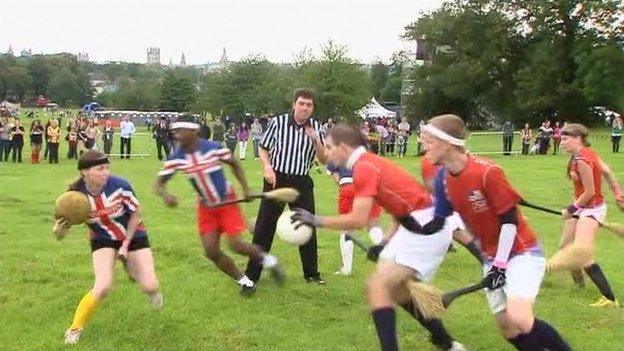Bangor University hope to set up an all-Wales quidditch league
- Published
Uni team's hope for all-Wales Quidditch league
No, the balls don't fly, and neither do the players - but they do still have broomsticks, quaffles and bludgers.
If it all sounds familiar, then you're obviously a Harry Potter fan.
But now quidditch has broken out of the fantasy world of Hogwarts to become one of the fastest growing sports in the UK.
The brilliantly titled Bangor Broken Broomsticks are one of the UK's leading university teams.
Indeed, two of the Bangor players have been picked for the national squad, and the team hope to create an all-Wales league.
And although it sounds like a hobby for Harry Potter fans usually found with their head in a book, quidditch is full contact, fast-paced and pretty hardcore.
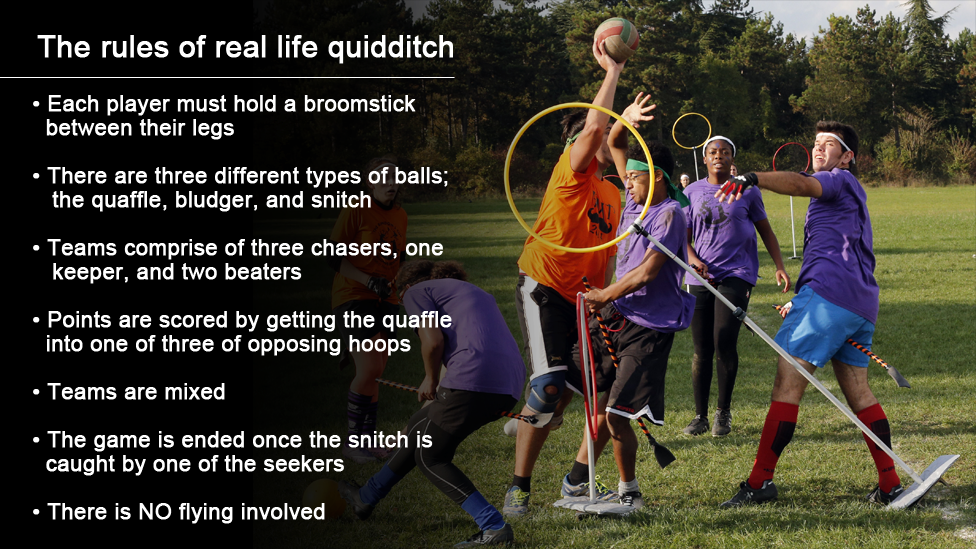
For creative writing student Alice McNaught-Davis, a love of Harry Potter - "it was a big part of my childhood" - was what initially drew her to quidditch.
"I half expected them all to be Harry Potter nerds," the 19-year-old said.
"I wasn't sure of the rules, because obviously we can't actually fly. But it was a lot of fun, and a lot more physically demanding than I expected."
She was soon hooked. "It's not just a sport - it's a community," she said.
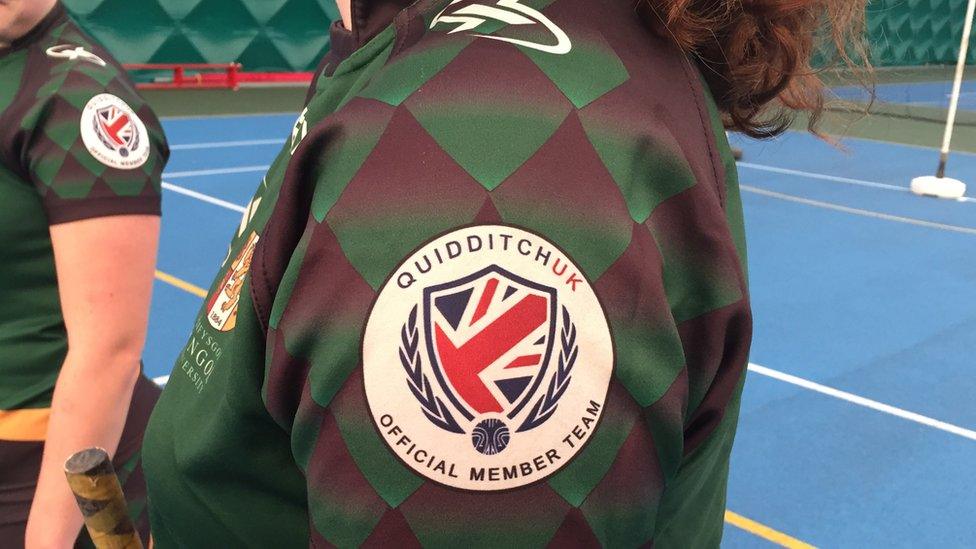
Quidditch is a fast growing sport, with many university teams
Quidditch is described as a mixture of rugby, handball, basketball, water polo and football.
Like the fictional version, each team is 21 players strong and consists of keepers, beaters, chasers and seekers, with six players from each team on the pitch at any one time.
The aim is to get the quaffle - a slightly deflated volleyball - through one of a set three hoops. A bludger - or dodgeball - is used to knock the quaffle out of player's hands, while the seeker's job is to capture the snitch, a small tennis ball, which is introduced onto the pitch after 17 minutes.
The team who captures the snitch wins.
Players are mounted on broomsticks - in reality, long sticks - at all times during play. Players are penalised if they let go of the sticks.
The effect is of several games going on simultaneously.
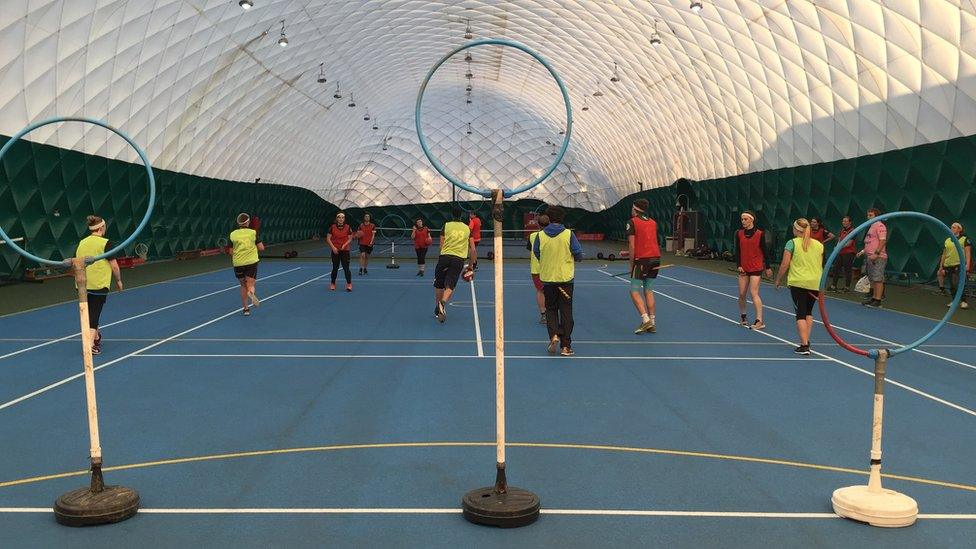
Bangor is one of two university quidditch teams in Wales, and Swansea also has a squad
It is this variety, said captain and psychology student Liam Vernon, 21, that makes it attractive to such a wide range of people.
Coupled with the fact that teams are mixed, quidditch attracts those who may not be interested in mainstream sport.
"It's very much an open sport for everyone. No matter what your athletic level, you can come along and give it a go," Liam explained.
Yet the Bangor team takes what it does pretty seriously. Training is a dizzying sequence of drills, stretching and practice moves.
And in October, the team won Edinburgh's Highlander Cup - the UK's original quidditch tournament.
Club secretary, music student and national squad player Callum Lake, 20, said he has "fallen deeply in love" with the sport.
"I wasn't into sport, but playing quidditch has completely changed my outlook," he explained.
"It's so diverse. You meet so many different personalities."
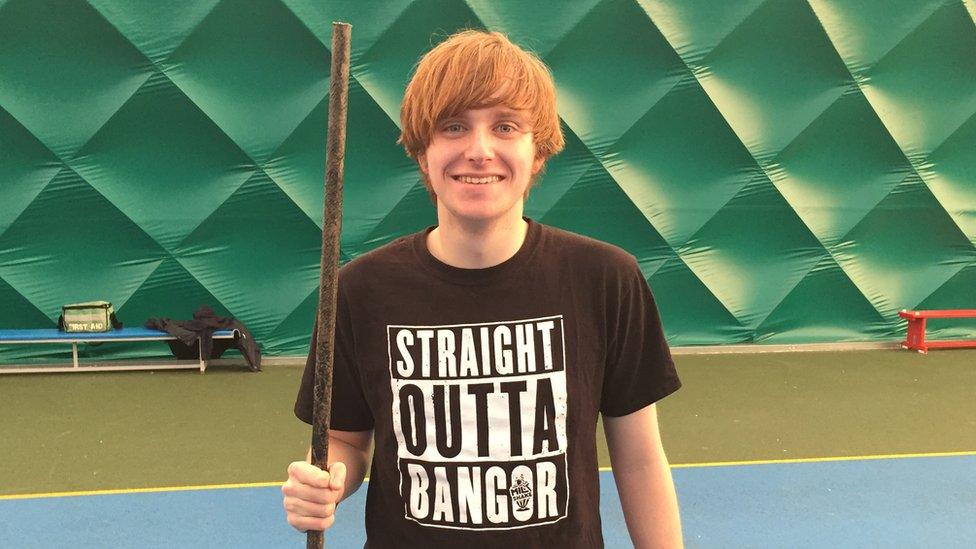
Many quidditch players are new to sport
Like Callum, Alice admitted that, before quidditch, she was never sporty.
"I was the person who would pretend to fall over and hurt myself so someone else would carry my bag," she laughed.
"But now I'm so much more in shape - which is really helpful for the Bangor hills.
"It doesn't matter what your degree is. You all have this common interest."
The inclusivity also crosses borders, and the global appeal of Harry Potter means the team is full of international players. Biology student Samantha Wulfestieg, 21, from California, normally plays water polo.
"I decided to look for something new - and that was quidditch. I tell people I play quidditch, and they usually ask, 'How do you fly?'" she said.
"It's so interesting to have a sport that has come out of a book. It's pretty neat."
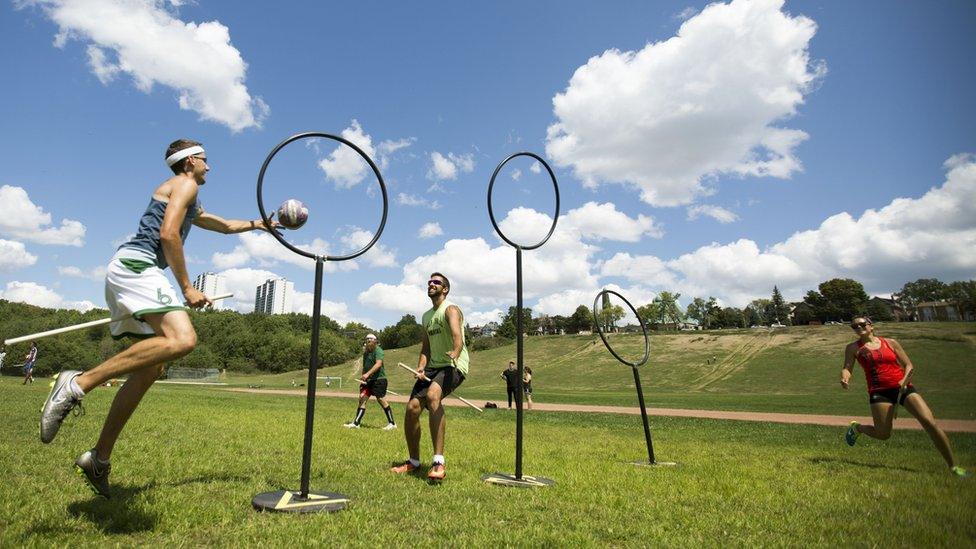
Quidditch players are keen to move away from the Harry Potter connection
Yet the thing that unites the team is not a love of wizards and spells, but a shared desire to see their beloved sport graduate away from its fictional origins.
In fact, last year's captain had never read a Harry Potter book in their life.
"We are trying to get it recognised as a sport in its own right, not just a hobby that Potter fans do," Liam said.
With quidditch mooted as a potential Olympic discipline, and with 20,000 players worldwide, the sport has definitely made the move into the world of muggles.
And although Callum admits that people "can be mean" about his passion, he confidently brushes off any comments.
"When sports are new, they've got to build up a reputation.
"It's one of the best sports out there."
- Published9 November 2013
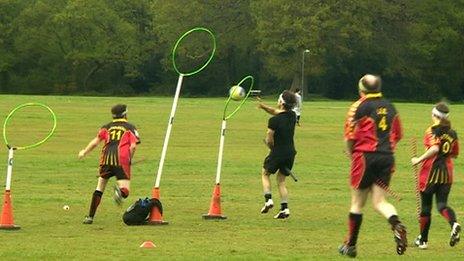
- Published10 July 2012
